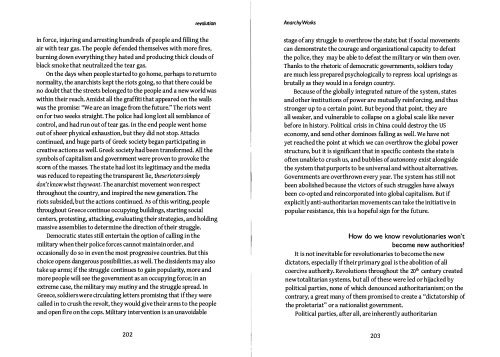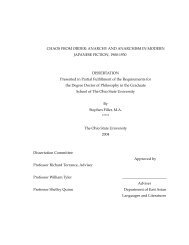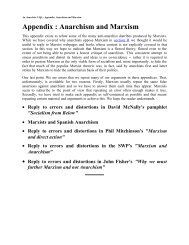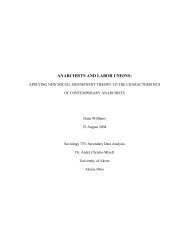Anarchy Works.pdf - Infoshop.org
Anarchy Works.pdf - Infoshop.org
Anarchy Works.pdf - Infoshop.org
You also want an ePaper? Increase the reach of your titles
YUMPU automatically turns print PDFs into web optimized ePapers that Google loves.
evolution<br />
<strong>Anarchy</strong> <strong>Works</strong><br />
in force, injuring and arresting hundreds of people and filling the<br />
air with tear gas. The people defended themselves with more fires,<br />
burning down everything they hated and producing thick clouds of<br />
black smoke that neutralized the tear gas.<br />
On the days when people started to go home, perhaps to return to<br />
normality, the anarchists kept the riots going, so that there could be<br />
no doubt that the streets belonged to the people and a new world was<br />
within their reach. Amidst all the graffiti that appeared on the walls<br />
was the promise: "We are an image from the future." The riots went<br />
on for two weeks straight. The police had long lost all semblance of<br />
control, and had run out of tear gas. In the end people went home<br />
out of sheer physical exhaustion, but they did not stop. Attacks<br />
continued, and huge parts of Greek society began participating in<br />
creative actions as welL Greek society had been transformed. All the<br />
symbols of capitalism and government were proven to provoke the<br />
scorn of the masses. The state had lost its legitimacy and the media<br />
was reduced to repeating the transparent lie, these rioters simply<br />
don't know what they want. The anarchist movement won respect<br />
throughout the country, and inspired the new generation. The<br />
riots subsided, but the actions continued. As of this writing, people<br />
throughout Greece continue occupying buildings, starting social<br />
centers, protesting, attacking, evaluating their strategies, and holding<br />
massive assemblies to determine the direction of their struggle.<br />
Democratic states still entertain the option of calling in the<br />
military when their police forces cannot maintain order, and<br />
occasionally do so in even the most progressive countries. But this<br />
choice opens dangerous pOSSibilities, as well. The dissidents may also<br />
take up arms; if the struggle continues to gain popularity, more and<br />
more people will see the government as an occupying force; in an<br />
extreme case, the military may mutiny and the struggle spread. In<br />
Greece, soldiers were circulating letters promising that if they were<br />
called in to crush the revolt, they would give their arms to the people<br />
and open fire on the cops. Military intervention is an unavoidable<br />
stage of any struggle to overthrow the state; but if social movements<br />
can demonstrate the courage and <strong>org</strong>anizational capacity to defeat<br />
the police, they may be able to defeat the military or win them over.<br />
Thanks to the rhetoric of democratic governments, soldiers today<br />
are much less prepared psychologically to repress local uprisings as<br />
brutally as they would in a foreign country.<br />
Because of the globally integrated nature of the system, states<br />
and other institutions of power are mutually reinforcing, and thus<br />
stronger up to a certain point. But beyond that point, they are<br />
all weaker, and vulnerable to collapse on a global scale like never<br />
before in history. Political crisis in China could destroy the us<br />
economy, and send other dominoes falling as welL We have not<br />
yet reached the point at which we can overthrow the global power<br />
structure, but it is significant that in specific contests the state is<br />
often unable to crush us, and bubbles of autonomy exist alongside<br />
the system that purports to be universal and without alternatives.<br />
Governments are overthrown every year. The system has still not<br />
been abolished because the victors of such struggles have always<br />
been co-opted and reincorporated into global capitalism. But if<br />
explicitly anti-authoritarian movements can take the initiative in<br />
popular resistance, this is a hopeful sign for the future.<br />
How do we know revolutionaries won't<br />
become new authorities?<br />
It is not inevitable for revolutionaries to become the new<br />
dictators, especially if their primary goal is the abolition of all<br />
coercive authority. Revolutions throughout the 20th century created<br />
new totalitarian systems, but all of these were led or hijacked by<br />
political parties, none of which denounced authoritarianism; on the<br />
contrary, a great many of them promised to create a "dictatorship of<br />
the proletariat" or a nationalist government.<br />
Political parties, after all, are inherently authoritarian<br />
202<br />
203
















